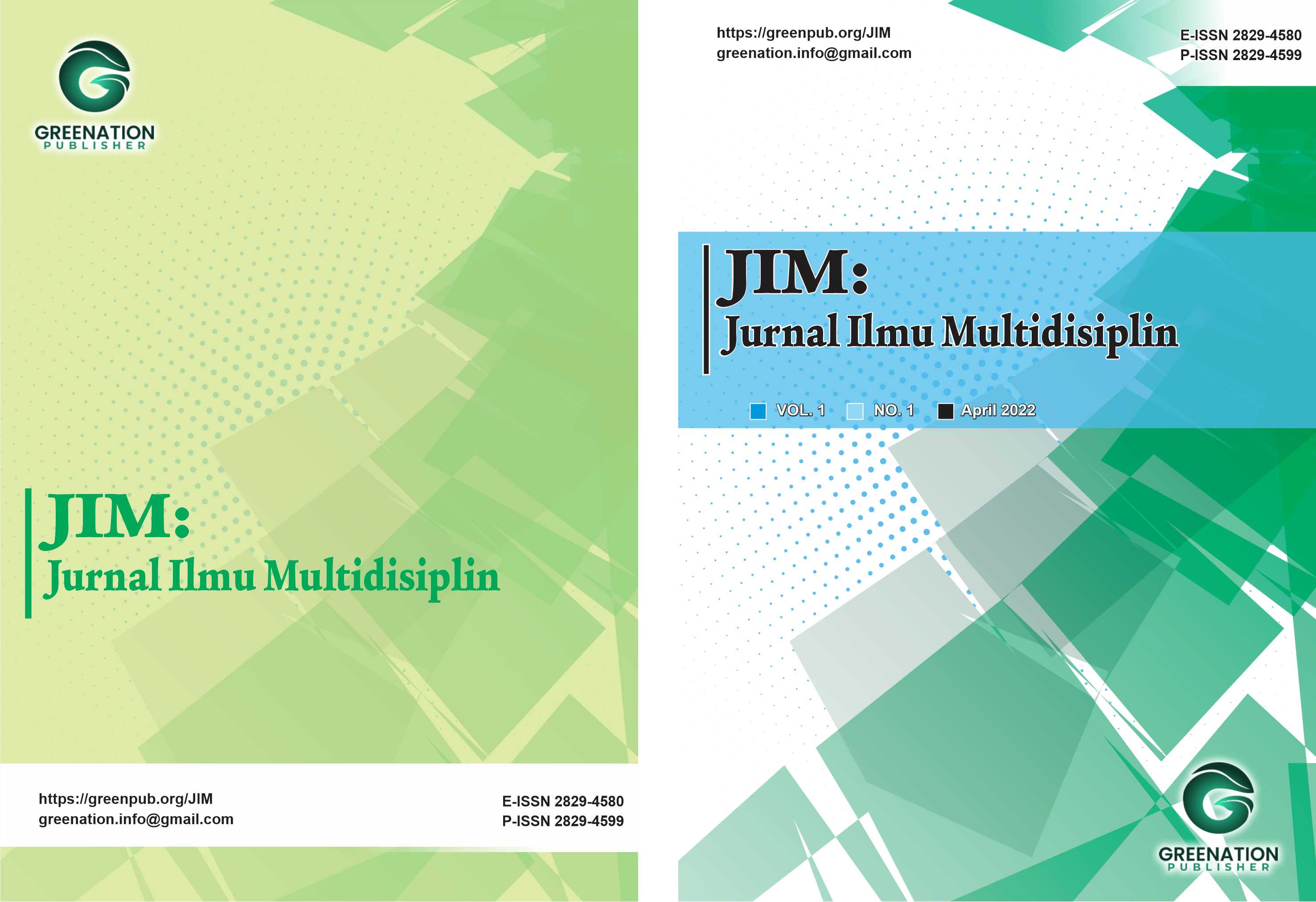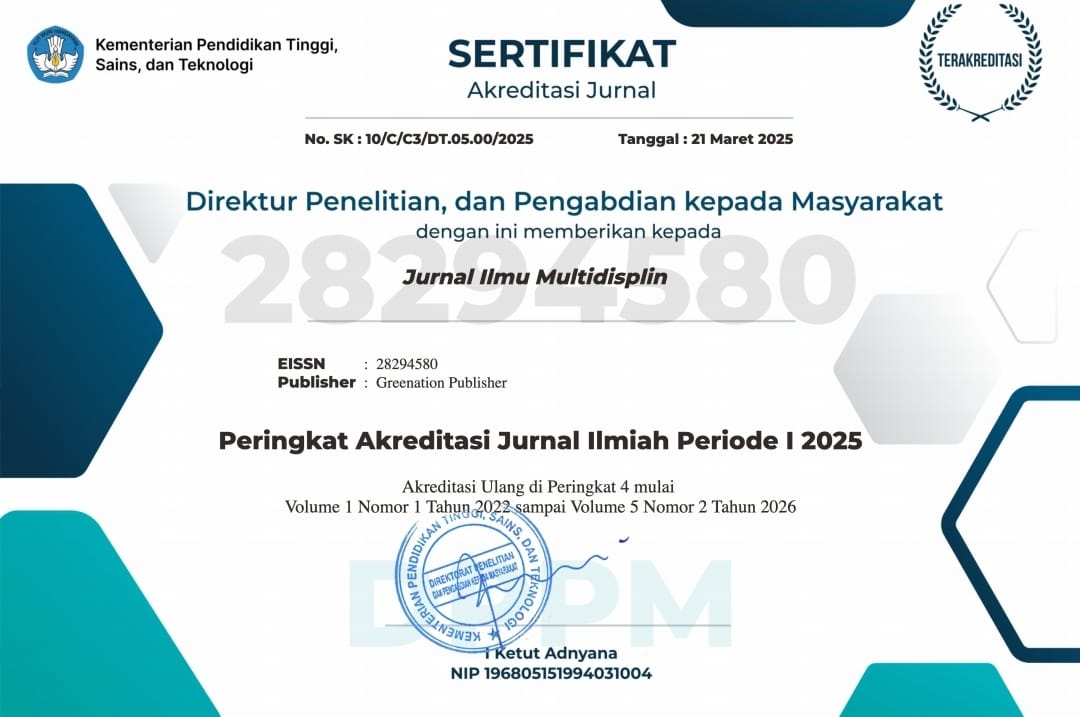Pengaruh Prudence terhadap Kualitas Laba dengan Mekanisme Corporate Governance sebagai Moderasi
DOI:
https://doi.org/10.38035/jim.v4i3.1281Keywords:
Prudence, Earnings Quality, Good Corporate GovernanceAbstract
Penelitian ini bertujuan untuk menguji pengaruh Prudence terhadap Kualitas Laba, dan menguji apakah Mekanisme Corporate Governance dapat memperkuat pengaruh Prudence terhadap Kualitas Laba. Jenis data yang digunakan pada penelitian ini adalah sekunder berupa laporan keuangan perusahaan yang dijadikan sampel. Metode penelitian yang digunakan dalam penelitian ini adalah metode penelitain kuantitatif. Sampel dipilih dengan menggunakan metode purposive sampling. Untuk pengujian hipotesis, penelitian ini menggunakan analisis regresi linier berganda. Berdasarkan hasil penelitian yang diharapkan pada penelitian ini adalah: (1) Prudence berasosiasi terhadap kualitas laba, (2) Kepemilikan manajerial memperkuat pengaruh prudence terhadap kualitas laba, (3) Kepemilikan Institusional memperkuat pengaruh prudence terhadap kualitas laba, (4) Dewan Direksi memperkuat pengaruh prudence terhadap kualitas laba, (5) Komisaris Independen memperkuat pengaruh prudence terhadap kualitas laba.
References
Abd-Elnaby, Hala, and Ola Aref. 2019. The Effect of Accounting Conservatism on Investment Efficiency and Debt Financing: Evi dence from Egyptian Listed Companies. International Journal of Accounting and Financial Reporting 9: 116.
Abdou, Hussein A., Nouran N. Ellelly, Ahmed A. Elamer, Khaled Hussainey, and Hassan Yazdifar. 2021. Corporate governance and earnings management nexus: Evidence from the UK and Egypt using neural networks. International Journal of Finance & Eco nomics 26: 6281–311.
Abou-El-Sood, H. and El-Sayed, D., 2022. Abnormal disclosure tone, earnings management and earnings quality. Journal of Applied Accounting Research. Ahmed, Anwar, and Scott Duellman. 2007. Evidence on the role of accounting conservatism in corporate governance. Volume 43, pp. 411–37.
Alles, Michael G., and Srikant Datar. 2004. How do you stop the books being cooked? A management- control perspective on financial accounting standard setting and the section 404 requirements of the Sarbanes-Oxley Act. International Journal of Disclosure and Governance 1: 119–37.
Ararat, Melsa, Stijn Claessens, and B. Burcin Yurtoglu. 2020. Corporate governance in emerging markets: A selective review and an agenda for future research. Emerging Markets Review 48: 100767.
Ardillah, K., Breliastiti, R., Setiawan, T., & Machdar, N. M. (2022). The Role of Ownership Structure in Moderating The Relationship Between Tax Avoidance, Corporate Social Responsibility Disclosure, and Firm Value. Accounting Analysis Journal, 11(1), 21-30. Disclosure. Ultimaccounting Jurnal Ilmu Akuntansi, 14(2), 246-263.
Ashbaugh, Hollis, Daniel W. Collins, and Ryan LaFond. 2004. Corporate governance and the cost of equity capital. Emory, University of Iowa. Retrieved on January 26: 2006.
Asri, Marselinus. 2017. The Effect of Accounting Conservatism on Earning Quality. Available at SSRN 2992129. Available online: https://ssrn.com/abstract=2992129 (accessed on 25 November 2018).
Ball, Ray, and Lakshmanan Shivakumar. 2005. Earnings quality in UK private firms: Comparative loss recognition timeliness. Journal of Accounting and Economics 39: 83–128.
Ball, Ray, S. P. Kothari, and Ashok Robin. 1997. The Effect of Institutional Factors on Properties of Accounting Earnings: International Evidence. Working paper. Rochester: University of Rochester.
Barth, Mary E., and Katherine Schipper. 2008. Financial reporting transparency. Journal of Accounting, Auditing & Finance 23: 173–90.
Basu, Sudipta. 1997. The conservatism principle and the asymmetric timeliness of earnings1. Journal of Accounting and Economics 24: 3–37.
Beasley, Mark S. 1996. An Empirical Analysis of the Relation between the Board of Director Composition and Financial Statement Fraud. The Accounting Review 71: 443–65.
Becker, Bo, Henrik Cronqvist, and Rüdiger Fahlenbrach. 2011. Estimating the Effects of Large Shareholders Using a Geographic Instrument. The Journal of Financial and Quantitative Analysis 46: 907–42.
Beekes, Wendy, Peter Pope, and Steven Young. 2004. The link between earnings timeliness, earnings conservatism and board com position: Evidence from the UK. Corporate Governance: An International Review 12: 47–59.
Benkraiem, Ramzi, Saad Itidel Ben, and Faten Lakhal. 2021. New insights into IFRS and earnings quality: what conclusions to draw from the French experience? Journal of Applied Accounting Research 22: 307–33.
Benkel, Mark, Paul Mather, and Alan Ramsay. 2006. The association between corporate governance and earnings management: The role of independent directors. Corporate Ownership & Control 3: 65– 75.
Bhattacharya, Nilabhra, Hemang Desai, and Kumar Venkataraman. 2013. Does earnings quality affect information asymmetry? Evi dence from trading costs. Contemporary Accounting Research 30: 482–516. Bliss, J. H. 1924. Management through Accounts. New York: The Ronald Press.
Breliastiti, R., Putri, S., & Valentina, S. (2020). Penerapan Gcg Dan Dampaknya Pada Csr (Perusahaan Pemenang Iigc–Asean Cg Scorecard). Jurnal akuntansi bisnis, 13(2).
Bushee, Brian J. 1998. The influence of institutional investors on myopic R&D investment behavior. Accounting Review: 305-33. Caskey, Judson, and Volker Laux. 2017. Corporate Governance, Accounting Conservatism, and Manipulation. Management Science 63: 424–37.
Chatterjee, Chanchal. 2021. Ownership pattern, board composition, and earnings management: Evidence from top Indian companies. International Journal of Disclosure and Governance 18: 179–92.
Chen, Naiwei, and Min-Teh Yu. 2021. National Governance and Corporate Liquidity in Organization of Islamic Cooperation Coun tries: Evidence based on a Sharia-compliant Liquidity Measure. Emerging Markets Review 47: 100800.
Hakki, T. W., Lesmana, M., & Selviany, S. (2023). Pengaruh Tax Management Dan Intellectual Capital Terhadap Firm Performance Yang Dimoderasi Oleh Kepemilikan Manajerial Di Era Pandemik Covid-19. Accounting Cycle Journal, 4(2), 45-56.
Hakki, T.W., Simanungkalit, J., & Siat, M. (2023). Pengaruh Tax Self-Assessment System, Money Ethics, Dan Religiusitas Terhadap Tax Evasion. Jurnal Analisa Akuntansi dan Perpajakan, Volume 7, Nomer 2, pp.160–171. https://doi.org/10.25139/jaap.v7i2.7007
Hakki, T.W., & Surjadi, M. (2023). Pengaruh Moral Pajak Dan Etika Uang Terhadap Kepatuhan Wajib Pajak Umkm Dengan Peran Sistem Digitalisasi Pajak Sebagai Pemoderasi Saat Era New Normal Pandemik Covid-19. Jurnal Analisa Akuntansi dan Perpajakan, Volume 7, Nomer 1, pp.1–18. https://doi.org/10.25139/jaap.v7i1.5518
Tjendra, M. J. ., Setiawan, T., & Riswandari, E. . (2024). Analisis Faktor-Faktor yang Memengaruhi Tindakan Penggelapan Pajak (Studi Literatur Tahun 2018-2023). Owner : Riset Dan Jurnal Akuntansi, 8(3), 2661-2676. https://doi.org/10.33395/owner.v8i3.2145
Kurnia Sari, M. M., & Pangestu, J. (2025). The Effect of Tax Planning, Deferred Tax Expense, Deferred Tax Assets, Dividend Policy, Debt Policy on Profit Management in Infrastructure Sector Companies, as Well as Transportation and Logistics Listed on the IDX for the 2019-2023 Period. Indonesian Interdisciplinary Journal of Sharia Economics (IIJSE), 8(2), 6665-6683. https://doi.org/10.31538/iijse.v8i2.6585
Kurniawan, B., & Rusli, Y. M. (2020). Pengaruh Board Of Commissioners, Independent Board Of Commissioners Dan Profitability Terhadap Carbon Emmission Disclosure. In Proseding Seminar Nasional Akuntansi (Vol. 3, No. 1).
Surjadi, M., Sofianty, D., Whittleliang Hakki, T., & Pohan, P. (2024). The Effect Of Corporate Values, Conservatism, And Earnings Quality On Audit Opinion Going Concern. Journal of Accounting and Finance Management, 5(3), 479–486. https://doi.org/10.38035/jafm.v5i3.690
Valaskova, Katarina, Peter Adamko, Katarina Frajtova Michalikova, and Jaroslav Macek. 2021b. Quo Vadis, earnings management? Analysis of manipulation determinants in Central European environment. Oeconomia Copernicana 12: 631–69.
Valaskova, Katarina, Tomas Kliestik, and Dominika Gajdosikova. 2021c. Distinctive determinants of financial indebtedness: Evidence from Slovak and Czech enterprises. Equilibrium. Quarterly Journal of Economics and Economic Policy 16: 639–59.
Veronica, E. 2013. Analysis of the effect of accounting conservatism on the quality of accrual profit that is moderated by good corpo rate governance in LQ 45 on the Indonesia Stock Exchange (IDX). Journal of Audit and Accounting, Faculty of Economics 2: 31–57.
Watrin, Christoph, and Robert Ullmann. 2012. Improving earnings quality: The effect of reporting incentives and accounting stand ards. Advances in Accounting 28: 179–88.
Watts, Ross. 2003. Conservatism in Accounting—Part II: Evidence and Research Opportunities. Accounting Horizons 17: 287–301.
Xu, Wei, Kun Wang, and Asokan Anandarajan. 2012. Quality of reported earnings by Chinese firms: The influence of ownership structure. Advances in Accounting 28: 193–99.
Ye, Kangtao, Ran Zhang, and Zabihollah Rezaee. 2010. Does top executive gender diversity affect earnings quality? A large sample analysis of Chinese listed firms. Advances in Accounting 26: 47–54.
Zeghal, Daniel, and Zouhour Lahmar. 2018. The effect of culture on accounting conservatism during adoption of IFRS in the EU. International Journal of Accounting and Information Management 26: 311–30.
Zhang, Xi, Simon Gao, and Yi Zeng. 2019. An empirical study of the relationship between accounting conservatism and executive compensation-performance sensitivity. International Journal of Accounting and Information Management 27: 130–50.
Zhu, Minghao, Andy C. L. Yeung, and Honggeng Zhou. 2021. Diversify or concentrate: The impact of customer concentration on corporate social responsibility. International Journal of Production Economics 240: 108214.
Downloads
Published
How to Cite
Issue
Section
License
Copyright (c) 2025 Tandry Whittleliang Hakki, Jocelyn, Pearlie Angelin

This work is licensed under a Creative Commons Attribution 4.0 International License.
You are free to:
- Share— copy and redistribute the material in any medium or format
- Adapt— remix, transform, and build upon the material for any purpose, even commercially.
The licensor cannot revoke these freedoms as long as you follow the license terms.
Under the following terms:
- Attribution— You must give appropriate credit, provide a link to the license, and indicate if changes were made. You may do so in any reasonable manner, but not in any way that suggests the licensor endorses you or your use.
- No additional restrictions— You may not apply legal terms or technological measures that legally restrict others from doing anything the license permits.
Notices:
- You do not have to comply with the license for elements of the material in the public domain or where your use is permitted by an applicable exception or limitation.
- No warranties are given. The license may not give you all of the permissions necessary for your intended use. For example, other rights such as publicity, privacy, or moral rightsmay limit how you use the material.



























